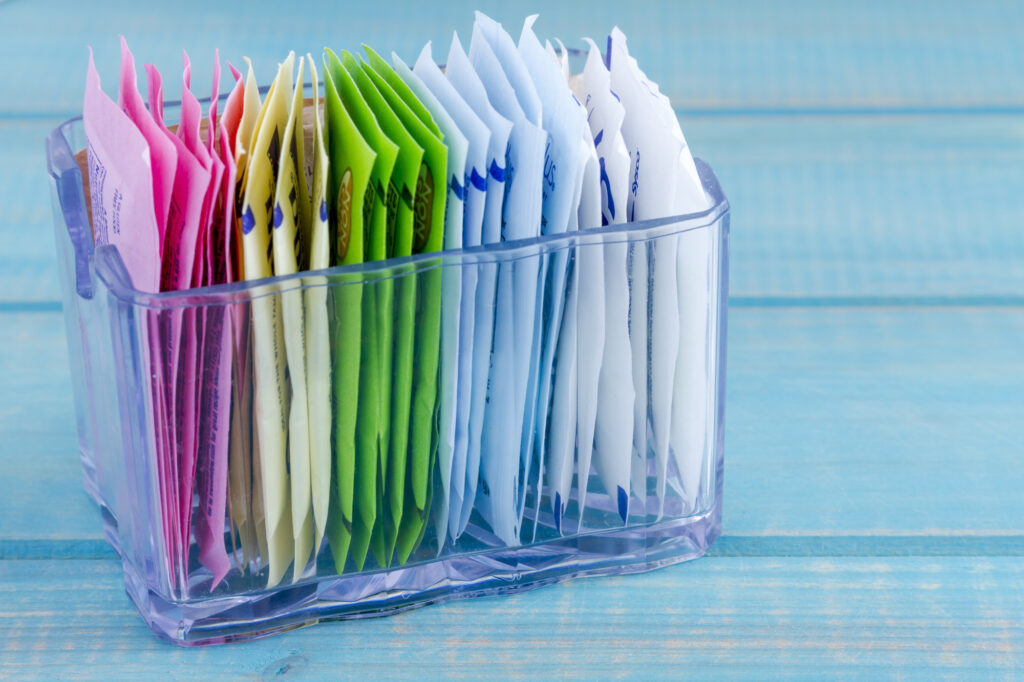Once touted as low-calorie substitutes that could help reduce incidence of diabetes and help people lose weight, artificial sweeteners such as aspartame, sucralose, and saccharine have come under more scrutiny in recent years. Concerns about their potential health risks have only been heightened based on data suggesting they do not help with long-term weight loss and may be linked to higher risks for type 2 diabetes and heart disease.
There are also questions about the potential negative effects that sugar substitutes may have on the gut microbiome, which plays a vital role in overall health. And it was this question that researchers from Cedars-Sinai Medical Center recently put to the test. Their results were published in the peer-reviewed journal iScience.
The Study
The investigators used samples and data from a group of adults participating in Cedars-Sinai’s REIMAGINE study or patients undergoing standard-of-care esophagogastroduodenoscopy (EGD) without colon prep. All enrolled subjects provided duodenal luminal aspirate cultures (used to detect infections in the small intestine) as well as fasting blood samples for analysis. A subset also provided optional stool samples.
Of the 650 subjects enrolled in the REIMAGINE study at the time, 101 reported consumption of some type of non-sugar sweeteners. After disqualifying a number of participants for potential confounding issues such as type-2 diabetes, 44 subjects remained. They were divided into two groups: 35 who consumed non-aspartame non-sugar sweeteners, and 9 who consumed aspartame only (ASP). Aspartame was studied separately because it is composed of amino acids (aspartic acid and phenylalanine), and the researchers hypothesized that might affect the microbiome differently than other sugar substitutes.
A group of 55 control (CON) subjects who did not consume artificial sweeteners was then included in the study, matched for age, sex, and BMI with the other participants.
After analyzing the samples, the researchers identified significant differences in both stool and duodenal microbial diversity and composition, as well as in levels of circulating inflammatory markers, in the NANS and ASP groups, as compared with the controls.
“We found that the richness of the bacteria in the small bowel was less in those subjects consuming non-aspartame non-sugar sweeteners when compared to controls, whereas bacterial richness in those consuming aspartame was similar to controls,” said Ruchi Mathur, MD, lead author of the study.
“[W]hen we looked at predicted metabolic pathways in these bacteria, we noted that the pathway of cylindrospermopsin, a toxin, was enriched specifically in small bowel bacteria of subjects who consumed aspartame. This pathway is recognized for its harmful effects on the liver and the nervous system, and it is classed as a potential cancer-causing agent.”
Conclusions
While the study suffered from several drawbacks, including its small size and self-reported sweetener use, the researchers noted that the results could have far-reaching implications.
“Given the crucial role played by small intestinal microbes in digestion, nutrient absorption, immune regulation, and endocrine functions, coupled with the substantial prevalence of [artificial sweetener] consumption among U.S. adults (estimated at 41.4%), our findings have potential implications for metabolic and gastrointestinal health in a considerable proportion of the American adult population,” they wrote in their conclusion.






